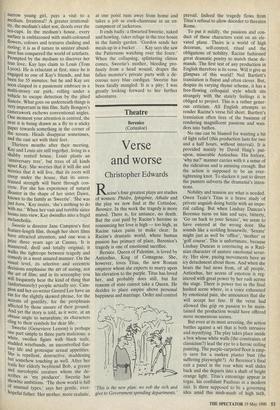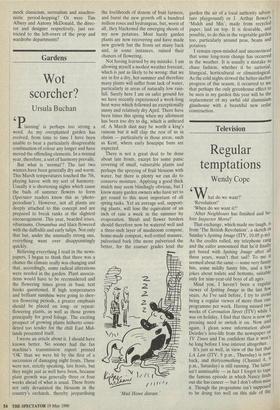Theatre Berenice (Cottesloe)
Verse and worse
Christopher Edwards
Racine's four greatest plays are studies of women: Phedre, 1phigenie, Athalie and the play we now find at the Cottesloe, Berenice. In this work the tragedy is more muted. There is, for instance, no death. But the cost paid by Racine's heroine in renouncing her love is high — too high, as Racine takes pains to make clear. In Racine's dramatic world, where human passion has primacy of place, Berenice's tragedy is one of emotional sacrifice. Bernice, Queen of Palestine, is loved by Antiochus, King of Comagene. She, however, loves Titus, the new Roman emperor whom she expects to marry upon his elevation to the purple. Titus has loved her, and probably does still, but for reasons of state cannot take a Queen. He decides to place empire above personal happiness and marriage. Order and control `This is the new plan: we rob the rich and give to Government spending departments.' prevail. Indeed the tragedy flows from Titus's refusal to allow disorder to threaten Rome.
To put it mildly, the passions and con- duct of these characters exist on an ele- vated plane. Theirs is a world of high decorum, self-control, ritual and the obligations of nobility. Racine fashioned great dramatic poetry to match these de- mands. The first test of any production in English therefore is its verse. Will it give us glimpses of this world? Neil Bartlett's translation is fluent and often clever. But, despite its varying rhyme scheme, it has a free-flowing colloquial style which sits strangely with the stately feelings it is obliged to project. This is a rather gener- ous criticism. All English attempts to render Racine's verse fall short. Bartlett's translation often tires of the business of rendering magnificent passions and wan- ders into bathos.
No one can be blamed for wanting a bit of light relief (this production lasts for two and a half hours, without interval). It is provided mainly by David Haig's put- upon, miserable Antiochus. His forlorn, `why me?' manner carries with it a sense of the ridiculous and is amusing enough. But the action is supposed to be an ever- tightening knot. To slacken it just to divert the punters subverts the dramatist's inten- tions.
Nobility and tension are what is needed. Owen Teale's Titus is a brave study of private anguish doing battle with an impe- rial calling. But when Lindsay Duncan's Berenice turns on him and says, bitterly, `Go on back to your Senate', we seem to have entered at the wrong door. She sounds like a scolding housewife. 'Senate' might just as well be 'office', 'mother' or `golf course'. This is unfortunate, because Lindsay Duncan is convincing as a Raci- Man character of austere emotional sever- ity. Her slow, pacing movements have an icy detachment about them. And when she hears the bad news from, of all people, Antiochus, her access of emotion is reg- istered with great power by her rush across the stage. There is power too in the final hushed scene where, in a voice exhausted by emotional pain, she announces that she will accept her fate. If the verse had allowed this grip on passion to be main- tained the production would have offered more momentous scenes.
But even at its most arresting, the action battles against a set that is both intrusive and mystifying. The play takes place inside a box whose white walls (the constraints of classicism?) lead the eye to a heroic ceiling painting. The purple-carpeted floor is emp- ty save for a sunken plaster bust (the suffering playwright?). At Berenice's final exit a panel in the rear white wall slides back and she departs into a shaft of bright orange light. Titus's entourage appear in togas, his confidant Paulinus in a modern suit. Is there supposed to be a governing idea amid this mish-mash of high tech, mock classicism, surrealism and anachro- nistic period-hopping? Or were Tim Albery and Antony McDonald, the direc- tor and designer respectively, just res- tricted to the left-overs of the prop and wardrobe departments?



































































 Previous page
Previous page